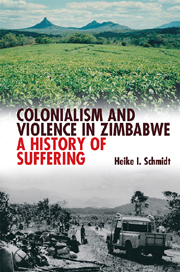7 - Epilogue
Violence That Does Not Haunt
Published online by Cambridge University Press: 05 May 2013
Summary
This book calls for a re-examination of the concept of violence by accommodating its ambiguity in a complex understanding of the past. It investigates how those who suffer violence invest experiences of violation with meaning and thus accommodate them in their lives. Such accommodation is not merely a coping strategy or a simple overcoming of a harrowing past. Instead, healing refers to the re-articulation of self and the promise of social harmony in the face of a fractured sense of being and belonging. The three main threads running through the study – violence, memory, and landscape – lead to general conclusions regarding each concept as well as specific insight into the Honde Valley's and Zimbabwe's past.
In an age of accelerated violent conflict that ranges from insurgencies through warlordism, sex trafficking and gang warfare, lessons can be learned from how African men, women, and children make sense of violence in practices and cosmologies alternative to modes common in the western world. Following John Lonsdale's concept of ‘moral ethnicity’ as a shared set of values that are centred on the notion of civic virtue and debated and articulated in discourse, practice, and everyday encounters, one can locate vernacular knowledge of healing and the importance of social health in the realm of such moral ethnicity. Interpreting memories and experiences of violence within the arena of moral ethnicity and healing reveals the complexity of the concept of violence: it discloses a range of motivations for using, supporting, and opposing violence; it emphasises the potential disconnect between violence and violation; and it shows healing practices which open avenues beyond western-style approaches such as individualised psychological and psychiatric treatment, judicial process, truth and reconciliation commissions, or national apologies.
- Type
- Chapter
- Information
- Colonialism and Violence in ZimbabweA History of Suffering, pp. 245 - 250Publisher: Boydell & BrewerPrint publication year: 2013



